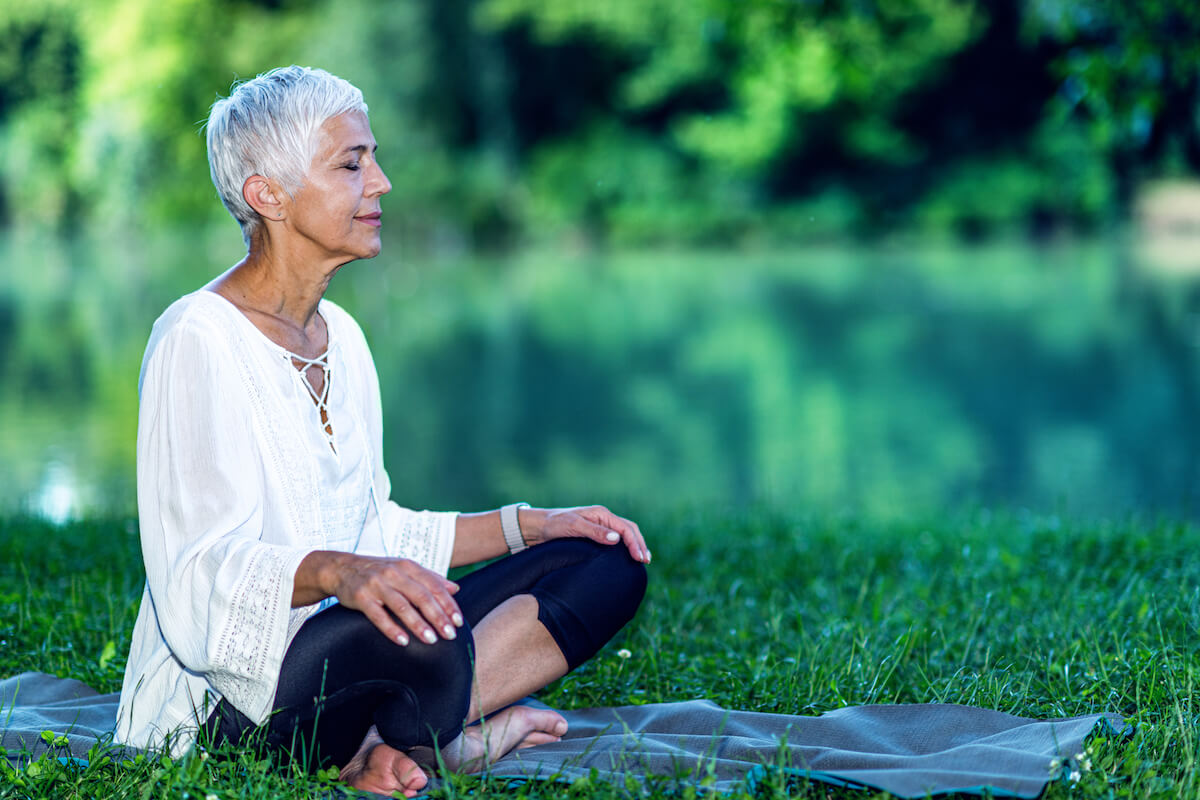
Everyone experiences feelings of anxiety occasionally. In fact, some anxiety can even help alert our bodies that something is wrong or we’re in danger. However, in today’s society, anxiety has become less of a warning sign and more of a debilitating condition that weighs on you every time you turn on the TV or leave your house.
With the increased stressors present today, including (but not limited to) a global pandemic, it’s now estimated that one in three Americans are living with anxiety, depression, or both.
For older adults, anxiety can be especially harmful because many lack proper access to mental health professionals or are merely unfamiliar with mental health conditions at all. Also, many older adults live alone and may not be able to safely schedule and travel to appointments.
With independent living, assisted living, and memory care communities throughout San Antonio, Texas, Franklin Park® Senior Living knows how prevalent stress and anxiety can be in older adults. We’re sharing some information on why this is the case and tips and strategies for anxiety management.
Anxiety Triggers for Older Adults
As we age, we face certain situations and challenges that we may not have encountered before—including age itself. These new and unfamiliar situations can cause feelings of anxiety, tension, and stress and make it difficult for adults to embrace aging with excitement and positivity. Some of these triggers include:
- Loss of independence
- Financial concerns after retirement
- Chronic medical conditions
- Side effects of medications
- Grief and loss
- Loneliness and isolation (especially prevalent during COVID-19)
- A decline in memory and cognitive function
Unfortunately, not all of these situations are avoidable, but how you approach the situation can largely determine how stressful it will be for you. By learning effective ways to manage stress and anxiety, you can face these changes and events with a calm, clear attitude.
4 Tips for Anxiety Management
1. Meditation & Deep Breathing
Meditation and deep breathing have been shown to quickly and significantly reduce stress and anxiety levels. When you slow down and breathe deeply, it can reduce your heart rate and lower your stress levels. If you’re feeling stressed, it’s a good idea to repeat deep breathing exercises throughout the day to keep your heart rate decreased. There are several different types of deep breathing exercises that you can try when you’re feeling anxious, including:
- Abdomen Breathing: Breathe deeply with your belly as opposed to your chest.
- Equal Breathing: Inhale for four seconds, then exhale for the same four-second count.
- Lion’s Breath: Breathe in through your nose and exhale through the mouth, vocalizing a “ha” sound and letting your mouth hang wide open with your tongue out.
After performing these steps, your body will naturally calm down and alleviate some of the tension you may feel.
Another relaxation technique to try is mindful meditation. While deep breathing is a type of meditation, other types can help ease feelings of stress and anxiety. Meditation can seem intimidating to those who aren’t used to it; however, there are techniques and methods that can make it simple. There are a lot of guided video and audio meditations available that can help beginners get used to the practice. The main goal of meditation is to disregard all thoughts and feelings that are causing your anxiety and simply sit and be present in the moment.
2. Maintain a Nutritious, Balanced Diet
Eating healthy has many known benefits. One benefit is having a sustainable amount of energy for your mind to function correctly. When you aren’t eating healthily, your body lacks the nutrients it needs to operate at peak performance. While certain foods and nutrients won’t necessarily cause or eliminate anxiety, maintaining an overall healthy diet can help sustain general mental well-being.
However, some foods have been shown to reduce anxiety levels and provide essential nutrients. A few of these foods are:
- Fatty fish, such as salmon
- Asparagus
- Foods rich in zinc, such as eggs, oysters, and cashews
- Food rich in Vitamin B, such as almonds and avocados
In addition to eating an overall healthy diet, there are certain habits you can make that could potentially support anxiety management.
- Eat breakfast with protein every day. This can ensure you begin your day with plenty of energy and keep you fuller longer.
- Avoid a lot of sugary foods. Simple carbohydrates and sweets can increase your heart rate and make you feel nervous.
- Limit caffeine intake, especially after the morning. Too much caffeine can make you feel jittery and interfere with your sleep.
- Stay hydrated. Drinking plenty of water throughout the day can help prevent feelings of dizziness and headaches.
3. Get Exercise
Exercising has endless benefits for your mind and body, so it shouldn’t come as a surprise that exercising is a great stress reliever. Virtually any form of exercise or movement produces endorphins—the “feel-good” chemical that acts as an anxiety reducer, mood booster, and overall positivity creator. Exercising doesn’t have to be strenuous or lead to breathing heavily and sweating, but it is essential to maintain a regular exercise schedule.
Here are some fun, low-impact activities and exercises that are great options for older adults looking to get active!
- Basic Strength Exercises: Simple strength training exercises like step-ups, shoulder circles, squats, and lunges can be done with light weights or just bodyweight.
- Water Aerobics: This activity is a great way to build strength without putting too much pressure on your joints.
- Yoga or Tai Chi: These practices involve movements that focus on stretching, strengthening, and encouraging mindfulness.
Most of these exercises aren’t particularly difficult for older adults, but we recommend speaking to a doctor before making any changes in your exercise routine. If you’re currently living in an assisted living community, you can talk with your care providers and inquire which exercises they can work into your weekly schedule.
4. Seek Help
The most beneficial anxiety management tip is to accept help and support. You can exercise, eat well, and practice mindfulness and meditation, but sometimes you still can’t shake the feelings of stress, anxiety, or depression. If this sounds like you, it could be time to consider reaching out for help. It can be scary or embarrassing to ask for help, even from your closest friends or family. Still, with over 40 million Americans experiencing anxiety, chances are you’re not alone in your feelings.
Whether you seek help from a family member, friend, or mental health care professional, it can immediately feel like a weight has lifted from your shoulders. Simply having someone to talk to can make many people feel less anxious. In addition, many professionals specialize in anxiety and are trained to help individuals effectively manage overwhelming emotions or feelings.
There are many resources available to those experiencing stifling anxiety—it just takes bravery and courage to seek them out. If you are feeling overwhelmed or anxious and are seeking someone to talk to, we encourage you to explore the available resources in San Antonio.
Enjoying Life Despite Anxiety
With the help of these anxiety management tips, you’ll be able to manage your anxiety effectively and prevent it from controlling your life.
Remember, if you believe that you cannot manage your condition effectively on your own, it’s best to seek professional advice. Don’t procrastinate in using these tips, and start making a change in your life today.
Franklin Park® Senior Living believes that mental health should be a priority for our residents and the overall senior population. Our independent living, assisted living, and memory care communities throughout San Antonio, Texas, are dedicated to ensuring residents remain healthy and happy and have access to any mental health resource they need.
To learn more about Franklin Park® Senior Living and our luxury independent living communities, please visit our website.
Updated on April 15, 2021
